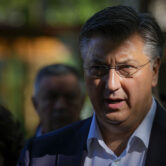BUENOS AIRES, Argentina (CN) — Argentina will preside over the United Nations Human Rights Council after a unanimous vote last week by all 47 member states of the council.
Ambassador Federico Villegas, permanent representative of Argentina to the U.N. office at Geneva, will serve as president for a one-year term beginning on Jan. 1, 2022, taking over for the council's current president Nazhat Shameem Khan of Fiji.
The vote took place in a symbolic week for Argentina, as Dec. 10 marked the 38th anniversary of the nation's return to democracy.
Argentina has never led the U.N, body before, and the council's vote comes as a nod to Argentina's maturing democratically since emerging from a brutal military dictatorship in 1983.
“Argentina arrives at the presidency of the world’s most important body in the field of human rights precisely after a long history of work since restoring democracy,” said Lucio Lopez, a human rights lawyer based in the capital of Buenos Aires.
“The country has a trajectory of constant constructive dialogue with the international community to advance the progressive development of the recognition of human rights in the rest of the world. It now has the opportunity to share at the international level its history of permanent struggle for the recognition of human rights, for its struggle for memory, and for justice.”
From the mid-1970s to the early 1980s, Argentina's military government carried out its infamous Dirty War against suspected left-wing activists and sympathizers that led to the forced disappearance of up to 30,000 civilians.
Human rights groups grew in response to the state repression, including the Mothers of the Plaza de Mayo, an association of women who lost children to the Dirty War and held vigils in the public square in front of the presidential palace.
After the restoration of democracy in 1983 when Raúl Alfonsín was elected president, human rights organizations like the Mothers of the Plaza de Mayo testified at the large-scale trials and sentencings of the members of the military.
But following military pressure, the Argentine Congress passed repeated laws in 1986 (the Full Stop Law) and in 1987 (the Law of Due Obedience) that halted further trials and granted immunity to all military rank and file.
During the presidency of Carlos Menem from 1989 to 1999, members of the military dictatorship — some of whom were convicted of crimes against humanity and were serving life sentences — received pardons.
“When the military cases were at a standstill due to the laws of Full Stop and Due Obedience, there were other files that continued to be processed,” Lopez said. “These were the files to find and identify the 30,000 people who disappeared during the dictatorship. The criminal cases were at a standstill, but the struggle for truth and justice continued.”
In 2005, the Argentina Supreme Court declared the amnesty laws of 1986 and 1987 unconstitutional. The ruling led to the resumption of trials against military officers and of crimes against humanity.
It has been a long road toward restoring accountability.
“It is a history of the struggle of human rights organizations to ensure that the state does not guarantee impunity for crimes committed during a dictatorship,” Lopez added.
One of these human rights organizations is Memoria Abierta (Open Memory), an alliance of nonprofits that promotes the memory of past violations in order to strengthen democracy.
“With tireless persistence, these organizations managed to mobilize the state in relation to their demands and marches,” the group's director Veronica Torras said, “to a point where the Argentine state has become an example to the world of how to deal with traumatic pasts. This particular history has generated strong roots of human rights in the country and has led to the formation of various generations of human rights activists.”
Torras added that “following the guidelines of international human rights law, the state has developed multiple public policies based on this perspective while in permanent dialogue with civil society organizations, which have constantly monitored issues of human rights.”
Lopez said the yearslong struggle to address past wrongs “undoubtedly demonstrates the growth and maturity of democracy and of Argentina as a state governed by the rule of law.”
Looking toward 2022, Ambassador Villegas has proposed a series of actions that include making sure the Human Rights Council is a “platform to increase dialogue and deepen understanding about commonalities and differences about human rights” as well as to “learn more about the multiple roles placed by civil society organizations in improving human rights at the global and national levels.”
Lopez believes that during its presidency, Argentina will “promote the protection of human rights of people and groups that are vulnerable or historically discriminated against, such as children, indigenous peoples, migrants and refugees, the LGBTIQ community, people with disabilities, and of course everything related to the politics of memory, truth, justice, and reparation.”
In addition to the election of the president, the Human Rights Council tapped ambassadors from Germany, Libya, and Uzbekistan to serve as vice presidents.
Subscribe to Closing Arguments
Sign up for new weekly newsletter Closing Arguments to get the latest about ongoing trials, major litigation and hot cases and rulings in courthouses around the U.S. and the world.









